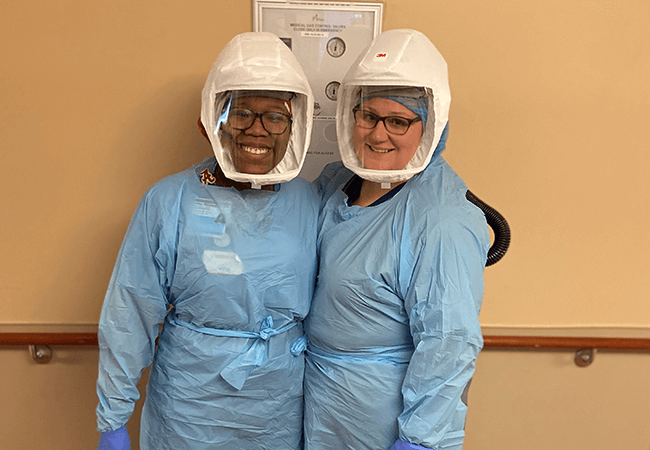
May 07, 2020
Pandemic Highlights Need to Thank Nurses Not Only During Nurses Week

Ashley Cleveland, RN and Whitney Richardson, Respiratory Therapist, at Vanderbilt University Medical Center treating COVID patients
It’s National Nurses Week, planned each year in honor of Florence Nightingale’s birthday (May 12). Every year, we at the Center to Champion Nursing in America (CCNA)—of which I am chief strategist—take the opportunity to celebrate the profession.
I am also a nurse. This year especially, it is a distinctive honor to be part of, and fighting for, the profession whose members are more than ever sacrificing so much during the pandemic of COVID-19.
Nurses have always been on the front lines, have always sacrificed to heal and to make others feel better. This year has exponentially increased those needs, as well as the dangers. Nurses, as with all health workers, including family caregivers who are helping their vulnerable loved ones at home, don’t necessarily want to be heroes—they just want to do their jobs as fully, and safely, as possible.
What we are seeing in this disorienting time is painful as well as inspiring. The pandemic has brought calls for the entire public to help nurses and all health care workers be safe—by staying home, by social distancing, by making masks, by donating blood. And the public is doing all that and more, including saying thank you in innovative (and safe) ways to all health care workers.
(The public, by the way, can stay informed through AARP’s Thursday Tele-Town Halls. Experts are available for viewers to ask questions about the latest information on COVID-19.)
Nurses’ actions through all of this have been nothing short of miraculous. They have shown up to work with less protective gear than they need; they have cared for those dying alone; they have witnessed even greater levels of pain and grief than before, experiences that might well affect them for years to come.
We at CCNA, an initiative of AARP Foundation, AARP, and the Robert Wood Johnson Foundation, advocate for nurses year-round because of the good they do for the health of the entire population, and so that they are better positioned to help more people. Through our Future of Nursing: Campaign for Action, we support nurses in multiple ways and push for change on a number of fronts.
The pandemic has made the strength of nursing and the need for our work even more clear.
COVID-19 has shown how much nurses do, under the worst conditions. It has shown as well the unevenness in our health care system, when some populations fare so much worse than others. Even before this, CCNA has been focused on addressing the health disparities that are all the more evident today. We have long worked with educators and others to increase the number of nurses from underrepresented populations. This is one step toward making access to health care more equitable throughout the U.S.
This National Nurses Week, in 2020, was long intended to be a special year for a special profession. The World Health Organization (WHO) last year had declared 2020 would be the Year of the Nurse and Midwife. WHO chose this year in part to honor Nightingale, because 2020 is exactly 200 years after the birth of this brilliant trailblazer—the statistician who built the foundation of nursing during a war.
WHO chose to shine a particularly bright light on nursing now for the same reason AARP long has: Influential organizations like ours must do more to support nurses and raise awareness of the real power, and greater potential, in the profession.
On April 7, World Health Day, WHO produced its first-ever State of the World’s Nursing report, making the case for greater investment in the profession around the globe.
The U.S., too, awaits a similarly broad assessment, this one from the National Academy of Medicine. The focus of that report, The Future of Nursing 2020-2030, is on what needs to happen to close health disparities in our communities and increase population health, and how nurses can lead the way—and in many cases, already are. The pandemic will surely make the report, scheduled for release in late 2020, even more timely and needed.
Historically, nurses have provided health care everywhere—in workplaces, schools, community centers, pharmacies, prisons, and in people’s homes. Their presence will be all the more important in the coming days, months, and, yes, years, in an environment that has so utterly transformed our lives. As I wrote last year, nurses are a big part of AARP because nurses are a big part of health. Nurses, who represent health and caring, embody the mission of both AARP and AARP Foundation to help people 50-plus seek and create wellness in all aspects of life.
Nurses deserve our respect and thanks, today more than ever. This National Nurses Week, we at CCNA will continue to honor nurses and celebrate all they do to improve the health and well-being of the U.S. population and improve health equity. We hope that you do, too.
This post was originally posted on AARP’s Thinking Policy blog.
Reinhard is senior vice president and director, AARP Public Policy Institute and chief strategist, Center to Champion Nursing in America.
